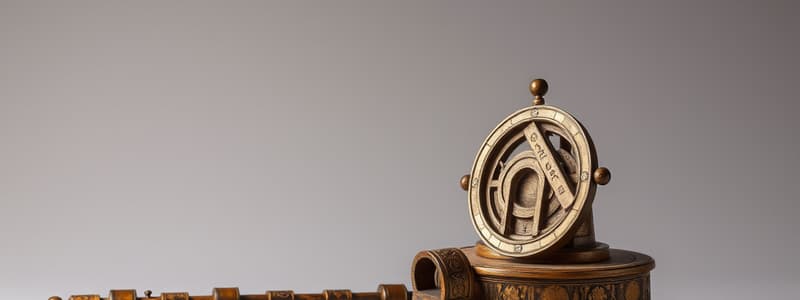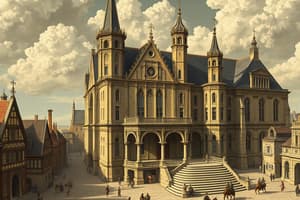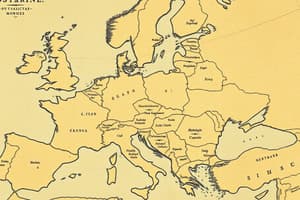Podcast
Questions and Answers
What was the geocentric theory?
What was the geocentric theory?
- The theory that planets move in elliptical orbits
- The belief that the earth was at the center of the universe (correct)
- The belief that the sun was at the center of the universe
- The view that the universe is expanding
The Scientific Revolution began in the early 17th century.
The Scientific Revolution began in the early 17th century.
False (B)
Who was the Greek philosopher whose ideas influenced the geocentric theory?
Who was the Greek philosopher whose ideas influenced the geocentric theory?
Aristotle
The invention of the __________ helped spread new ideas more widely during the Scientific Revolution.
The invention of the __________ helped spread new ideas more widely during the Scientific Revolution.
Who is considered the founder of modern chemistry?
Who is considered the founder of modern chemistry?
Match the following scholars with their contributions to the geocentric theory:
Match the following scholars with their contributions to the geocentric theory:
Which of the following was NOT a factor in the spread of the Scientific Revolution?
Which of the following was NOT a factor in the spread of the Scientific Revolution?
Boyle's law explains the relationship between volume, temperature, and mass of gas.
Boyle's law explains the relationship between volume, temperature, and mass of gas.
The Scientific Revolution involved a willingness to question accepted beliefs.
The Scientific Revolution involved a willingness to question accepted beliefs.
What did Jenner use to produce the world’s first vaccination?
What did Jenner use to produce the world’s first vaccination?
The physical world was formerly thought to consist of four elements: earth, air, fire, and ______.
The physical world was formerly thought to consist of four elements: earth, air, fire, and ______.
What did European explorers discover during the Renaissance that contributed to new ways of thinking?
What did European explorers discover during the Renaissance that contributed to new ways of thinking?
Match the following historical figures with their contributions:
Match the following historical figures with their contributions:
What movement challenged the relationship between government and its people?
What movement challenged the relationship between government and its people?
The Sceptical Chymist was written by Galileo Galilei.
The Sceptical Chymist was written by Galileo Galilei.
What does Boyle's law describe?
What does Boyle's law describe?
Which thinker is known for extending the emphasis on the individual to economic thinking?
Which thinker is known for extending the emphasis on the individual to economic thinking?
Philosophes advocated for blind obedience to authority figures.
Philosophes advocated for blind obedience to authority figures.
What natural rights does John Locke argue that people are born with?
What natural rights does John Locke argue that people are born with?
The ________ emphasized the importance of the individual in society during the Enlightenment.
The ________ emphasized the importance of the individual in society during the Enlightenment.
Match the following Enlightenment figures with their contributions:
Match the following Enlightenment figures with their contributions:
What was a common belief among the philosophes regarding government?
What was a common belief among the philosophes regarding government?
Some kings and queens during the Enlightenment were indifferent to the ideas of the philosophes.
Some kings and queens during the Enlightenment were indifferent to the ideas of the philosophes.
Explain one reason why some women might have been critical of the Enlightenment.
Explain one reason why some women might have been critical of the Enlightenment.
Which philosopher believed that the government should reflect the consent of the governed?
Which philosopher believed that the government should reflect the consent of the governed?
Voltaire's 'Candide' supports the philosophy of Optimism.
Voltaire's 'Candide' supports the philosophy of Optimism.
What method did Enlightenment writers often use to critique societal norms?
What method did Enlightenment writers often use to critique societal norms?
In 'Gulliver's Travels', Lemuel Gulliver's voyages lead him to several __________ lands.
In 'Gulliver's Travels', Lemuel Gulliver's voyages lead him to several __________ lands.
In Candide, what happens to those who attempt to escape from working at the sugar mill?
In Candide, what happens to those who attempt to escape from working at the sugar mill?
Match each author with their respective work:
Match each author with their respective work:
Hobbes believed that humans are naturally peaceful and that government is unnecessary.
Hobbes believed that humans are naturally peaceful and that government is unnecessary.
The king of Brobdingnag reacted with __________ to Gulliver's description of firearms.
The king of Brobdingnag reacted with __________ to Gulliver's description of firearms.
What motivated Catherine the Great to grant nobles absolute power?
What motivated Catherine the Great to grant nobles absolute power?
Catherine the Great expanded Russian territory significantly during her reign.
Catherine the Great expanded Russian territory significantly during her reign.
What was the significance of the First Partition of Poland?
What was the significance of the First Partition of Poland?
Catherine the Great fought two wars with the _____ Turks to gain control over the Black Sea.
Catherine the Great fought two wars with the _____ Turks to gain control over the Black Sea.
What was one of the main resources that Peter the Great sought during his reign?
What was one of the main resources that Peter the Great sought during his reign?
Serfs in Russia gained more freedom under Catherine the Great.
Serfs in Russia gained more freedom under Catherine the Great.
Who were the three neighboring powers involved in the partitioning of Poland?
Who were the three neighboring powers involved in the partitioning of Poland?
Match the following rulers with their respective actions:
Match the following rulers with their respective actions:
Flashcards are hidden until you start studying
Study Notes
Medieval Cosmology
- The geocentric theory posits that Earth is the universe's immovable center, with celestial bodies moving in circular paths around it.
- This belief stemmed from Aristotle's philosophy and Ptolemy's expansions in the second century A.D.
- Christianity reinforced this view, portraying Earth as a divine, central stage for life's events.
Scientific Revolution
- Starting in the mid-1500s, scholars began questioning established beliefs, leading to a transformative shift known as the Scientific Revolution.
- This movement emphasized observation and skepticism, challenging age-old doctrines.
- The Renaissance and exploration expanded horizons, revealing unfamiliar peoples and animals, which encouraged new inquiries.
- The printing press enabled rapid dissemination of revolutionary ideas across Europe.
Contributions to Chemistry
- Robert Boyle is recognized as the father of modern chemistry, advocating for the scientific method.
- In "The Sceptical Chymist" (1661), he refuted the classical four-element theory, proposing that matter consists of smaller particles.
- Boyle's law explains the interrelationship between gas volume, temperature, and pressure.
Enlightenment Thinkers
- The Enlightenment placed reason at its core, prompting re-examination of human rights and government roles.
- Philosophes championed the importance of individual reasoning and societal welfare.
- Adam Smith influenced economic thought by arguing that personal self-interest drives economic progress.
Key Figures and Concepts
- John Locke emphasized natural rights, asserting that individuals are entitled to life, liberty, and property.
- Enlightenment ideas inspired critiques of government authority and nurtured the concepts of social contracts and individual rights.
- Critics of Enlightenment, including some women, identified limitations in the movement, particularly regarding gender equality.
Enlightenment Literature and Satire
- Satirical literature, exemplified by Voltaire’s "Candide" and Jonathan Swift’s "Gulliver’s Travels," criticized societal norms and human folly.
- Voltaire aimed to dismantle optimism by depicting harsh realities, while Swift highlighted the absurdity of societal practices through fantastical narratives.
Catherine the Great
- As empress, Catherine expanded Russia's borders, securing access to the Black Sea after conflicts with the Ottoman Empire.
- She strategically participated in the Partition of Poland (1772-1795), asserting Russia's influence while Poland lost its independence.
Studying That Suits You
Use AI to generate personalized quizzes and flashcards to suit your learning preferences.



